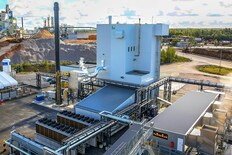- The plant received SEK 117 million in investment aid in 2017.
- Pyrocell was formed in 2018 and began production on September 2, 2021.
- The plant will produce 25,000 tonnes of non-fossil pyrolysis oil annually.
- Pyrolysis converts sawdust into oil for renewable diesel and petrol.

Production Overview
Pyrocell, jointly owned by Setra and Preem, has started production at Sweden’s first pyrolysis oil plant for biofuels in Gävle. The plant converts sawdust, a byproduct of Setra's industrial process, into non-fossil pyrolysis oil. This oil is further processed into renewable diesel and petrol at Preem’s refinery in Lysekil.
Investment and Timeline
In 2016, Setra initiated a feasibility study on bio-oil production using rapid pyrolysis technology. The project received SEK 117 million in investment aid from the Government’s Klimatklivet initiative in 2017. An environmental permit was granted in 2018, and Pyrocell was formed the same year. Construction began in March 2020, and production started on September 2, 2021.
Production Capacity
The plant is expected to produce around 25,000 tonnes of non-fossil pyrolysis oil annually, which is equivalent to the annual fuel consumption of approximately 17,000 cars. This initiative aims to replace fossil oil and increase the share of renewables in fuels, thereby reducing carbon dioxide emissions.
Pyrolysis Process
Pyrolysis involves rapidly heating a substance to a high temperature, vaporizing the solid material, which can then be condensed into a liquid. This process allows waste products from the forest, such as branches, roots, tops, and sawdust, to be converted into oil. The resulting oil can be refined into renewable petrol and diesel.

